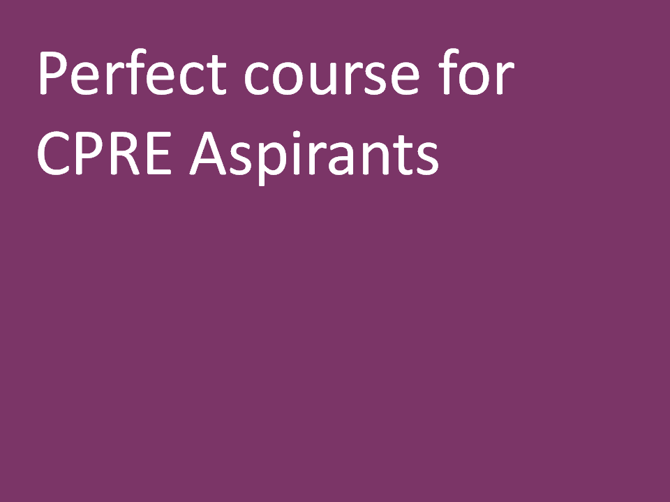
Workshop - CPRE
This program prepares the participants for CPRE certification by IREB, Germany.
Course Highlights
Adaptive Processes Consulting (www.AaptivePocesses.com) is an authorized training partner of IREB (www.IREB.org)
Covers essential tools and techniques like UML, BPM, Test Automation Tools, Requirement Elicitation
Complimentary e-learning on Business Analysis skills and concepts to all participants
Model questions for all participants
Case study based approach
Best in class courseware
Complimentary business analysis toolkit covering all essential templates and artifacts for all participants for the session
Hard copy course ware aligned to CPREFL Certification
Pre class reading material on BA tools to all participants
Course designed by an CBAP certified faculty with 20+ years experience in business analysis in multi-country and multi-cultural environment – North America, Asia, Europe - in several top-notch organizations such as IBM, Infosys, PwC, iGate etc.
Excellent participant feedbacks.
Sample templates, policies and artifacts from our BA tool kit which helps implementation of the concepts in BA activities.
Covers BA tools and techniques like UML, BPM, and Requirements elicitation, Stakeholder Management, Solution Assessment and Elicitation etc.
Key takeaways of the session
Includes hard copy course material for CPRE.
Perpetual access to BA elearning.
Pre-class study material on BA tools.
Comprehensive BA toolkit comprising of all essential BA artifacts like requirements templates, guidelines, checklists etc
Questions for CPRE certification preparation.
Dedicated session for Requirements gathering / UML tools software.
Project specific templates – Product Backlog, SRS, BRS, feasibility reports, RFI, RFQ, and CCB.
Summary of all tools and techniques.
Exposure to industry best practices on business analysis
Understanding of the BA role as per the industry requirements.
Case Study to provide a simulation of the implementation of BA concepts
Understanding the approach to answer Objective type Questions.
Assess preparedness for the CPRE examination
Analyze and understand the business problems
Dedicated one day of modeling and other BA tools practice session
Workshop Outline
Day 1: (In-class session – Requirements Engineering)
• Symptoms of inadequate RE and reasons for it
• Tools for RE
• Major activities of requirements engineering activities
• Types of requirements
• System context, system boundary and context boundary
• Types of requirements sources
• Principles in dealing with stakeholders (stakeholder rights and duties)
• Influencing factors for the choice of elicitation techniques
• Reasons for requirements documentation
• Natural language requirements documentation, Model-based requirements documentation form, Mixed form
• Advantages of standardized document structures and one widespread document structures
• Mastering and using quality criteria for requirements documents
• Mastering and using quality criteria for requirements
• Style rules for requirements
• Mastering and using contents and importance of a glossary
• Five transformational processes
• Mastering and using the five steps for formulating requirements using a requirements template
• Requirements attribute schemes
• Mastering and using views on requirements
• Methods for prioritizing requirements
• Requirements traceability
• Mastering and using versioning of requirements
• Managing requirements changes
• Review of concept questions
Day 2: (In-class session – Requirements Analysis)
• Introductions
• Requirements analysis activities
• Knowing the term “model” and the properties of models
• Mastering the modeling and using of goal relationships as and/or trees
• Mastering the modeling of and using use case diagrams
• Knowing the focus of the data perspective on requirements
• Knowing the focus of the functional perspective on requirements
• Knowing the focus of the behavioral perspective on requirements
• Break
• Requirements management activities
• Knowing the significance of validating requirements
• Mastering and using validation criteria for the quality aspects, content, documentation and agreement
• Knowing techniques for requirements validation
• Knowing activities for requirements negotiation
• Requirement management and modeling tools
• Mock examination
• Discuss answers to mock question
• Feedback and closure
Day 3: (UML session)
• Participant and faculty introduction
• Use case diagram
• Class diagram
• Activity diagram
• Health break
• Sequence diagram
• Lunch Break
• Component diagram
• Deployment diagram
• State chart diagram
• Health break
• Timing diagram
• Interaction overview diagram
• Review and closure
Day 5: (Web-based doubt clearing session with Faculty)
• Review of question answers
• Doubt clearing session
 Cart
Cart  Checkout
Checkout